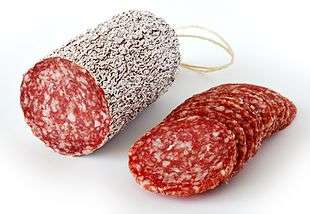Lebanon bologna
Lebanon bologna is a type of cured, smoked, and fermented semi-dry sausage. Made of beef, it is similar in appearance and texture to salami, though somewhat darker in color, and typically served as a cold cut or appetizer. Lebanon bologna has a distinct tangy flavor, moreso than other fermented meat products such as summer sausage. Hardwood smoking imparts a strong smokiness to the traditionally prepared versions of the product; increasingly, inexpensive liquid smoke is used as a substitute for this costly time and labor intensive process.
Origin
Lebanon bologna was developed in the 19th century by the Pennsylvania Dutch of Lebanon County, Pennsylvania, reflecting the slow-cured and smoked sausage traditions of northern Europe. Still produced primarily in that area, it is found in markets throughout the United States and typically served as a cold cut as well as an appetizer. In addition to the original, a sweet version is made.
Manufacturing
Lebanon bologna is slow cold smoked at a temperature below 120 °F (49 °C). Curing salts are added to control microbial growth during processing.[1]
Typically, the blended and stuffed beef sausage is aged for 10 days prior to smoking to enrich lactic acid bacteria and allow for the reduction of nitrate to nitrite.[2] Fermentation occurs during the smoking step, which can last for up to four days.[3] A one pH unit (or more) decline is observed during this step, as well as the development of nitrosohemochrome, the pigment responsible for the red color of cured meats.
See also
References
- ↑ Chikthimmah N, Ananthesweran R, Roberts R, Mills E, Knabel S (2001). "Influence of sodium chloride on growth of lactic acid bacteria and subsequent destruction of Escherichia coli O157:H7 of Lebanon bologna". J. Food Protection. 54 (8): 1145–50.
- ↑ Smith JL, Palumbo SA (October 1973). "Microbiology of Lebanon bologna". Appl Microbiol. 26 (4): 489–96. PMC 379833
 . PMID 4796166.
. PMID 4796166. - ↑ Palumbo S, Smith J, Ackerman S (1974). "Lebanon Bologna. I. Manufacture and processing". J Milk and Food Tech. 36 (10): 497–503.
External links
| Wikimedia Commons has media related to Lebanon bologna. |
